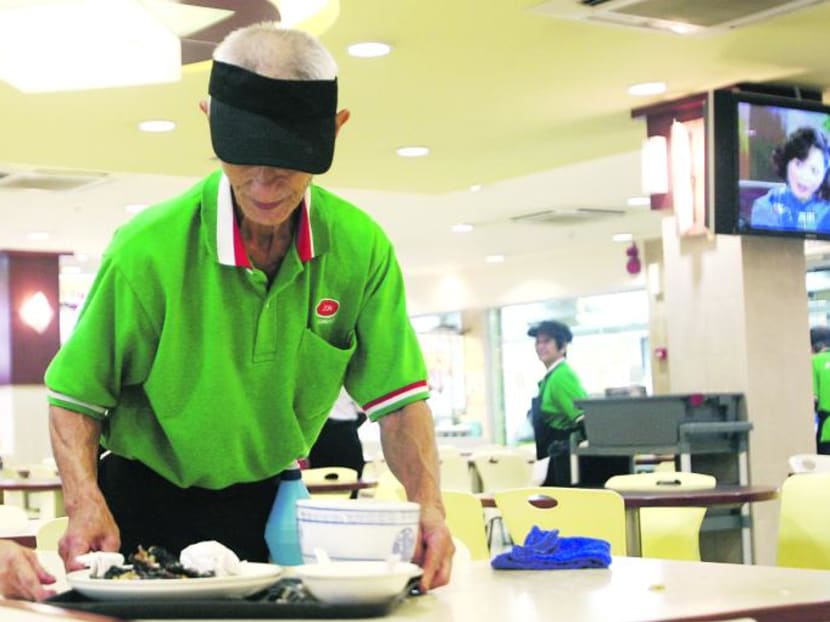Wage recommendations have to gain traction: Labour MP
SINGAPORE — It is important for the National Wages Council’s (NWC) recommendation on Friday — that wages for workers earning up to S$1,000 a month be raised by a minimum of S$60 — gains traction among employers.
SINGAPORE — It is important for the National Wages Council’s (NWC) recommendation on Friday — that wages for workers earning up to S$1,000 a month be raised by a minimum of S$60 — gains traction among employers.
Labour Member of Parliament Zainal Sapari said this yesterday, adding that the Government needs to proactively push non-unionised companies to take up the proposal.
Mr Zainal, who was speaking on the sidelines of the Family Recreation and Fun Carnival at Downtown East, said he is aware of comments that the S$60 built-in wage increase is too low, but the recommendation has to “gain traction with employers first before we even consider recommending a larger amount”.
Last year’s recommendation of a S$50 built-in quantum saw only a 30 per cent adoption rate among non-unionised companies, he noted.
For this year’s recommendation to have a higher take-up rate, the Pasir Ris-Punggol Member of Parliament said it is very important for both Government and business federations — such as the Singapore National Employers Federation (SNEF) and Singapore Business Federation, which have representatives in the NWC — to lead by example and be open to negotiating with their service providers to see how they could help low-wage workers enjoy the S$60 quantum.
People’s Action Party (PAP) town councils, for example, have pledged to work with their cleaning contractors to increase cleaners’ wages according to the NWC’s recommendations.
All 17 cleaning contractors under the 15 PAP town councils have adopted the recommended wage of at least S$1,000 per month for full-time cleaners who have completed the WSQ Perform Cleaning of Public Residential Estate (Manual).
Such efforts are crucial as most low-income earners in Singapore are working for outsourced contracts, Mr Zainal explained. Typical low-wage industries such as cleaning and security have about 62,000 and 40,000 workers respectively, and employers of these workers work on a fixed sum and could find it difficult to give built-in wage increases.
“Service providers are simple: They can give an increase if there is an increase in contract sum given to them. Without a top up to contract sum, it will be difficult to pay more to their employees,” said Mr Zainal, who is also Director of Unit for Casual and Contract Workers at the National Trades Union Congress.
Unionisation is also important, he said, pointing to the four out of five unionised companies that adopted last year’s NWC recommendations, compared to the 30 per cent among non-unionised ones. “I personally feel more workers should make an effort to be union members.”
Last year was the first time in almost three decades that the NWC had recommended a minimum quantum of pay rise.
The move to recommend quantitative guidelines for the second year running comes after the Government announced a S$3.6 billion Wage Credit Scheme in this year’s Budget, which covers 40 per cent of increments for the next three years for those earning not more than S$4,000 each month.
While SNEF President Stephen Lee said on Friday that it was “dicey” to link the scheme with the recommendations, Mr Zainal believes take-up rate of NWC recommendations this year might be better because of the scheme.
“Last year when we recommended for a S$50 increase, we didn’t have the Wage Credit Scheme. But now employers who are willing can enjoy a 40 per cent subsidy from the Government. So for every S$60 of increment, they can expect to get S$24 in subsidy,” he said.
Throughout the interview, the Labour MP stressed several times that the Government will have to be more proactive in encouraging non-unionised companies to adopt the recommendation. But he declined to say what these measures can be, other than the Government leading by example and helping low-wage workers get the quantum increment.
However, DBS economist Irvin Seah said the Government can only continue to help companies improve their productivity and efficiency, which will hopefully bring about better earnings for firms and lead to higher wages.
On this year’s NWC recommendations, Mr Zainal said the council took both a general and a specific approach. The general approach — of recommending that employees give low earners a built-in wage increase and a one-time lump sum payment to help offset the cost of living without specifying what constitutes a low-income group — was to keep guidelines flexible; whereas the specific recommendation of a minimum S$60 increment for those earning below S$1,000 was to look out for workers who draw a significantly low pay.
Recommendations for low-wage workers in general were kept unspecified as low-income can be considered differently across various sectors and companies. For example, in some industries, anything below S$2,000 can be considered as low-wage, while in others the figure could be S$1,500.
With the flexibility given in the guidelines, companies that are doing well might be willing to give more compared to those that are not doing as well, said Mr Zainal.







